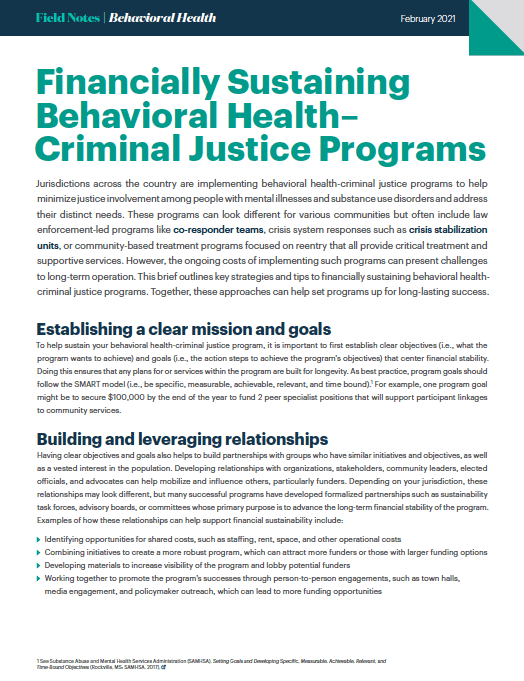Financially Sustaining Behavioral Health-Criminal Justice Programs
Financially Sustaining Behavioral Health-Criminal Justice Programs
For jurisdictions implementing behavioral health-criminal justice programs to help minimize justice involvement among people with mental illnesses and substance use disorders, the ongoing costs can present challenges to long-term operation. This brief outlines key strategies and tips to financially sustaining such programs so that they are built for longevity. Photo by Anna Earl on Unsplash.
Project Credits
Writing: Demetrius Thomas, CSG Justice Center
Research: Demetrius Thomas, CSG Justice Center
Editing: Darby Baham, Emily Morgan, CSG Justice Center
Design: Michael Bierman
Public Affairs: Ruvi Lopez, CSG Justice Center
ABOUT THE AUTHOR
The sharp rise in school shootings over the past 25 years has led school officials across the U.S.…
Read MoreA three-digit crisis line, 988, launched two years ago to supplement—not necessarily replace—911. Calling 988 simplifies access to…
Read MoreIt would hardly be controversial to expect an ambulance to arrive if someone called 911 for a physical…
Read More Taking the HEAT Out of Campus Crises: A Proactive Approach to College Safety
Taking the HEAT Out of Campus Crises: A Proactive Approach to College Safety
The sharp rise in school shootings over the past 25 years has…
Read More From 911 to 988: Salt Lake City’s Innovative Dispatch Diversion Program Gives More Crisis Options
From 911 to 988: Salt Lake City’s Innovative Dispatch Diversion Program Gives More Crisis Options
A three-digit crisis line, 988, launched two years ago to supplement—not necessarily…
Read More Matching Care to Need: 5 Facts on How to Improve Behavioral Health Crisis Response
Matching Care to Need: 5 Facts on How to Improve Behavioral Health Crisis Response
It would hardly be controversial to expect an ambulance to arrive if…
Read More










